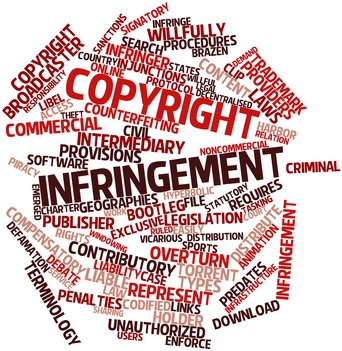Ever put your creative juices into a music project only for someone else to run off with your work and profit from it? Have you turned on the radio only to hear your lyrics or musical composition being played, while still not receiving a check? Has it troubled you to see a painting of yours in an art gallery receiving widespread acclaim with another artist receiving the credit for your work? Have you had a front seat to a screenplay, only to see that it was yours and performed without your blessing? If you’ve answered yes to any of these questions, you may be in the running for a claim of copyright infringement.
Keep in mind that what can be infringed upon extends to what can be copyrighted. So according to the United States Copyright Act, that means “original works of authorship fixed in a tangible medium of expression.” These original works include literary works, musical works, dramatic works, choreographic works, pictorial/graphic/sculptural works, motion pictures and other audiovisual works, sound recordings, and architectural works.
To determine whether you should pursue a claim of copyright infringement, it must be established by the plaintiff that (1) they have valid ownership of the copyright at issue, and (2) that the work that was copied consists of original elements. While each establishing element has additional elements that can either strengthen or weaken the actual existence of the element, so long as the two foundational elements are in place, an investigation into the claim can at least begin.
Although, you can never fully protect yourself against infringement, there are some protective measures that can be taken to ensure the quickest recourse to the taking of your work. First and foremost, be sure to register your work with the United States Copyright Office (USCO). Having the USCO recognize your work puts the world on notice of (1) the originality in the author, (2) the copyrightability of the subject matter, (3) a national point of attachment of the work, such as to permit a claim of copyright, and (4) compliance with the applicable statutory formalities [1] that copyrighted work must adhere to. All four of these will warrant a copyright registration certificate for the copyright owner and will be accepted as accurate until proven otherwise (prima facie evidence). This certificate will be golden in the event a legal dispute is anticipated and will serve as hard evidence of ownership. Also, be sure to familiarize yourself with the Intellectual Property (IP) Program of the Financial Institution Fraud Unit of the Federal Bureau of Investigation. Here, you can receive assistance and helpful tips regarding the unlawful taking of digital and electronic works, and other infringement related issues.
The claim of infringement can be quite complex considering the various decisions from several courts that include the application of infringement elements in somewhat conflicting ways. With that said, if you think you have a legitimate cause of action, consult with a IP Attorney to review your claim to prevent the wrongful exploitation of work that belongs to you.
More information can be found at the following resources:
[1] 4 Melville B. Nimmer & David Nimmer, Nimmer on Copyright § 13.01[A] (2011).
